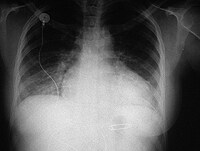LION-HEART: IV Levosimendan May Lower Natriuretic Peptides, Hospitalization in Advanced CHF Patients
Topic Alert
Receive an email from Medscape whenever new articles on this topic are available.
RELATED DRUGS & DISEASES
SEVILLE, SPAIN — Periodic administration of the intravenous inodilator levosimendan (Orion Pharma) is not only safe and tolerable for patients with advanced, chronic heart failure (HF), it may also improve clinical outcomes, suggests new research[1].
The Levosimendan Intermittent Administration in Outpatients: Effects on Natriuretic Peptides in Advanced Chronic Heart Failure (LION-HEART) trial of 69 adults from 12 centers in Spain showed that those who were randomly assigned to receive 6-hour cycles of IV levosimendan had significantly reduced concentrations of natriuretic peptides (N-terminal pro-brain natriuretic peptide [NT-proBNP]) after 12 weeks vs those receiving placebo (the primary end point), as well as significantly fewer HF hospitalizations and a combination of all-cause deaths/hospitalizations (secondary end points).
In addition, 91% of the treatment group and 81% of the placebo group received all scheduled infusions.
"These positive effects of levosimendan on NT-proBNP levels translated into clinical improvements," Dr Josep Comín-Colet (Hospital del Mar Medical Research Institute, Barcelona, Spain) told attendees at a late-breaking trials session at the Heart Failure Congress 2015 of the European Society of Cardiology Heart Failure Association.
Dr Josep Comín-Colet
|
Comín-Colet later told heartwire from Medscape that the investigators were happily surprised with the secondary outcomes—and with the low number of discontinuations in the treatment arm. "Patients looked at it as something they just needed to go through, like cycles of chemotherapy if they had had cancer," he said.
Of course, he noted that bigger studies are needed to see whether the clinical outcomes can be replicated, but, at least for now, "the findings are important for a patient population that was very sick. Perhaps we have something that can keep them stable until you can do something more, such as a transplant or [left ventricular assist device] LVAD."
Limited Therapeutic Options


No comments:
Post a Comment